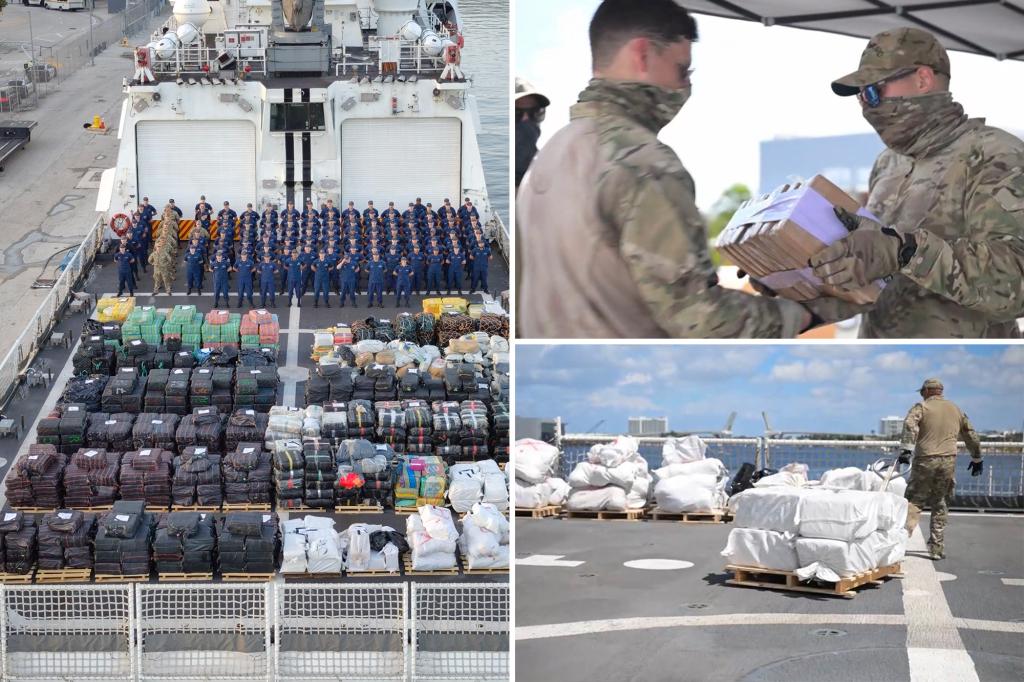Record-Breaking Drug Bust: US Coast Guard’s Unprecedented Operation Pacific Viper
In a remarkable display of maritime enforcement, the US Coast Guard announced its largest-ever drug seizure on Monday, offloading more than 70,000 pounds of illegal narcotics at Port Everglades, Florida. This extraordinary haul, consisting of 61,740 pounds of cocaine and 14,400 pounds of marijuana, represents not just a staggering quantity of contraband but a significant blow to international drug trafficking networks operating in waters near the United States. The scale of this seizure reflects the Coast Guard’s enhanced capabilities and determination in combating the flow of illegal substances that threaten communities across America. What makes this achievement particularly impressive is that these drugs were intercepted during a relatively brief period between June 26 and August 18, demonstrating the intensity and effectiveness of the Coast Guard’s recent operations in international waters.
Operation Pacific Viper, as this extensive anti-drug initiative was named, comprised 19 different missions primarily focused on waters surrounding Ecuador, Venezuela, and Mexico – known transit zones for drug smuggling into the United States. The operation’s single largest seizure occurred near Socorro Island, Mexico, where guardsmen intercepted an impressive 9,160 pounds of cocaine, representing approximately 12% of the total haul. Beyond merely intercepting floating contraband, Coast Guard personnel successfully stopped 11 go-fast vessels – specialized high-speed boats frequently employed by traffickers to outrun law enforcement – and detained 34 suspected drug traffickers in the process. This comprehensive approach to dismantling trafficking operations demonstrates the Coast Guard’s multi-faceted strategy in addressing not just the drugs themselves but the infrastructure and personnel responsible for their transport.
The financial and public health implications of this seizure are profound. Officials estimate the value of the intercepted drugs at approximately $473 million, representing a significant economic blow to the criminal organizations behind these trafficking operations. More sobering is the potential human impact these drugs might have had if they had reached their intended destinations – authorities calculate that this amount could provide around 23 million potentially lethal doses to users in the United States. Rear Admiral Adam Chamie, commander of the Coast Guard’s southeast district, provided a chilling perspective on the scale of this potential harm, noting that it would be “enough to fatally overdose the entire population of the state of Florida,” which stands at approximately 23.7 million residents according to the 2024 census. This stark comparison underscores the life-saving nature of the Coast Guard’s interdiction efforts.
“This represents a significant victory in the fight against transnational criminal organizations, highlighting our unwavering commitment to safeguarding the nation from illicit trafficking and its devastating impacts,” stated Rear Admiral Chamie. His words reflect the broader mission of the Coast Guard in protecting not just America’s maritime borders but the health and safety of its citizens from the devastating effects of drug addiction and overdose. The historic nature of this achievement is further emphasized by comparing it to the previous record – an offload of 61,130 pounds of drugs, primarily cocaine, valued at approximately $1.4 billion. The fact that Operation Pacific Viper exceeded this already impressive benchmark highlights the evolving capabilities of the Coast Guard and potentially the increasing boldness of drug traffickers attempting to move larger quantities of contraband through maritime routes.
The success of Operation Pacific Viper comes in the context of other significant anti-drug operations conducted by the Coast Guard. In July, separate from this record-breaking seizure, the branch intercepted approximately 5,000 pounds of cocaine and marijuana valued at roughly $20 million during a major Caribbean bust. This consistent pattern of successful interceptions demonstrates the persistent vigilance of the Coast Guard in monitoring vast stretches of international waters and their effectiveness in disrupting established trafficking routes. These operations represent just one facet of a broader national effort to combat drug trafficking, with various law enforcement agencies across the country contributing to this mission through their own record-breaking seizures.
Indeed, the Coast Guard’s achievements are part of a larger national trend of intensified drug interdiction efforts. In early August, the South Dakota Highway Patrol made headlines with its own record-breaking seizure when officers intercepted 207 pounds of crystal methamphetamine from an undocumented migrant passing through the state – the largest single meth seizure in that department’s history. This parallel development illustrates how the fight against drug trafficking involves coordinated efforts across multiple agencies, spanning maritime, air, and land borders. As traffickers adapt their methods and routes, law enforcement agencies like the Coast Guard continue to evolve their strategies and capabilities, resulting in these unprecedented seizures that protect communities and save countless lives from the devastating impacts of illegal narcotics.


